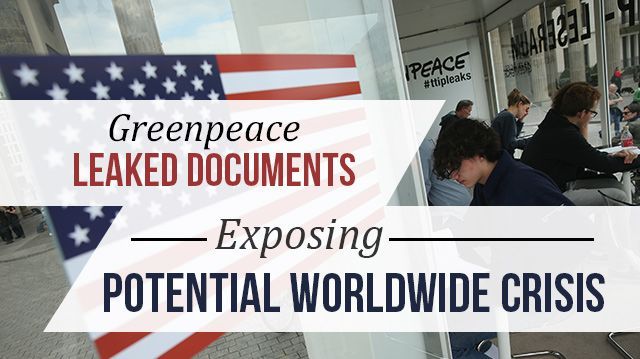
Greenpeace Netherlands released Transatlantic Trade and Investment Partnership (TTIP) documents, creating much-needed transparency. The treaty threatens to have sweeping implications on the environment and almost a billion citizens in the European Union (EU) and the United States.
Do you know what the Transatlantic Trade and Investment Partnership is?
If you haven’t heard about the Transatlantic Trade and Investment Partnership (TTIP), you’re not alone. The TTPI is a series of trade negotiations between the European Union and the United States, held mostly in secret with the intent of promoting trade and multilateral economic growth, which, they argue, would create millions of new paid jobs. Sounds great, so why all the secrecy?
The secrecy is a result of the partnership creating lax regulatory barriers for big business in areas such as food-safety law, environmental legislation, banking regulations and the sovereign powers of individual nations. Even before TTIP negotiations began last February 2015, the process had been secretive and undemocratic, says the Independent. In fact, nearly all of the information on negotiations has come from leaked documents and Freedom of Information requests.
TTIP food and environmental safety
The TTIP’s regulatory convergence agenda sought to bring EU food safety and the environment standards on par with the US. However, US regulations are far less strict than the EU. In actuality, 70 percent of all processed foods sold in the United States contains GMOs, or genetically modified ingredients. In comparison, the EU allows no GM foods. The US also has fewer restrictions on the use of pesticides, growth hormones in beef, which are linked to cancer. This should concern all Americans.
In terms of the environment, the EU has tougher regulations on potentially toxic substances as well. In Europe, a company has to prove a substance is safe before it can be used, says the Guardian. Whereas, the US can use any substance until it is proven unsafe.
What the leaked documents reveal
The documents expose how American trade negotiators have pressed their European counterparts to loosen important environmental and consumer protections, along with other provisions, says Greenpeace.
The leaked TTIP documents — published by Greenpeace — include 248 pages and cover highly controversial subjects such as EU food-safety standards, as well as details of specific threats such as the United States’ plan to end Europe’s ban on GMO foods.
“It is time to shine a light on these negotiations,” said Faiza Oulahsen, for Greenpeace Netherlands. “We should stop the negotiations and start the debate. The complete and most recent version of the treaty text should be released at once, so that citizens and elected representatives have the chance to understand what is being proposed in their names.”
American and European trade officials insisted on Monday that the 248 pages simply represent negotiating positions and that the criticisms are off base. Yet, according to Greenpeace, long-standing environmental protections appear to be dropped. Apparently, none of the chapters viewed reference the General Exceptions rule — a 70-year-old rule of the World Trade Organization (WTO) that allows nations to protect human, animal and plant life or health.
In addition, the ability to protect the climate becomes harder. According to the Paris Climate Agreement: We must keep temperature increase under 1.5 degrees to avoid a climate crisis that will affect billions of people worldwide — trade should not be excluded from climate action. However, Greenpeace suggests nothing can be found in the obtained texts indicating climate protection.
The documents also suggest managing hazardous substances rather than just avoiding them. The act of managing hazardous substances threatens environmental and consumer protection. The leaked documents also show the EU has not been open about corporate influence. A recent public report mentioned only minor industry input. Yet the leaked documents repeatedly talk about the need for further consultations with the industry and explicitly mention how industry input has been collected, Greenpeace suggests.
What this means for us
Whether you’re for or against Greenpeace’s somewhat controversial tactics, leaking the documents clearly exposes what governments don’t want citizens to know. It places leaders in the hot seat and forces them to be accountable for issues that affect all of us on a global scale.
“Whether you care about environmental issues, animal welfare, labor rights or Internet privacy, you should be concerned about what is in these leaked documents,” Greenpeace says.
These documents reflect an enormous transfer of power from people to corporate business with implications that both the US and EU place profit above human, animal, plant life and health.
While leaking these documents may not change the way the government operates, it does allow millions of concerned citizens the opportunity to oversee their government’s activities and to discuss these with their elected representatives.
—Katherine Marko
Sources:
https://p3-admin.greenpeace.org/international/en/press/releases/2016/Leaked-TTIP-documents-confirm-major-risks-for-climate-environment-and-consumer-safety
http://ec.europa.eu/trade/policy/in-focus/ttip
http://www.nytimes.com/2016/05/03/world/europe/ttip-greenpeace-leak-trade-deal.html
http://www.independent.co.uk/voices/comment/what-is-ttip-and-six-reasons-why-the-answer-should-scare-you-9779688.html
http://www.breastcancerfund.org/clear-science/environmental-breast-cancer-links/food/?referrer=https://www.google.ca

